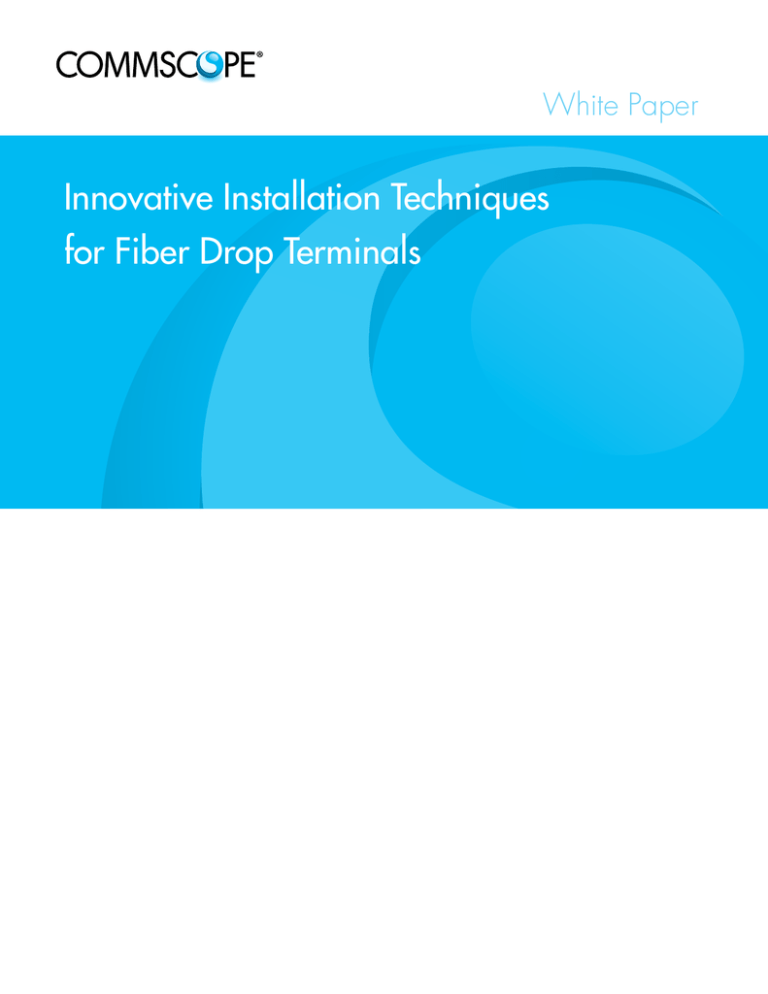
White Paper
Innovative Installation Techniques
for Fiber Drop Terminals
Pedestal with
Multiport
Service
Terminal
Hand-Hole with
Multiport
Service
Terminal
Drop
Cables
Aerial
Multiport
Service
Terminal
Splice
Case
Fiber
Distribution
Hub
Drop
Cables
Fiber OSP
Cable from CO
Hardened Connector Architecture
Multiport
As fiber-to-the-premises (FTTP) deployments increase, innovative
methodologies are being developed to make the installer’s life easier.
In the outside plant—from the central office (CO) to the optical network
terminal (ONT) at each subscriber premises, new techniques and better
products are helping to streamline the process of offering triple-play
services to the consumer.
Making the FTTP network as modular as possible, with easy plug-and-play
options, provides benefits, both during initial installation and throughout the
operational life of the network. CommScope has achieved a leadership
position in developing, testing, and delivering products that ensure
flexibility, reliability, and scalability for today’s FTTP initiatives.
This paper addresses one area in which CommScope heard the frustrations
of FTTP installers and developed a unique product that alleviates those
frustrations. The new multiport service terminal (MST) universal mounting
bracket is designed to save time, reduce complexity, and streamline the
process of mounting MSTs for installing drop cables in any FTTP deployment.
Adapting to the situation
CommScope developed a universal mounting bracket for installing MSTs. The most obvious
benefit of the universal mounting bracket is its compatibility to any mounting scheme. It easily
mounts to poles, in pedestals, in hand holes, or on strands.
Because the bracket adapts for all mounting situations, MST installations are accomplished in
less time and with reduced complexity. It also eliminates the logistics of ensuring brackets are
available for each type of mounting technique. Since it adapts to every mounting situation, there
is no possibility of the installer suddenly discovering the appropriate bracket is not available.
The snap-in/snap-out feature of the universal bracket makes the MST readily available for
drop cable connections or re-connections. Its rigid plastic structure—using the same material
as the MST—ensures it can withstand the same environmental exposures, including contracting
and expanding with temperature variations.
A single, reinforced latch enables easy MST detachment from the bracket, while an audible
engagement assures the MST is correctly snapped into place and properly seated in the
bracket’s cradle. The through holes align with the terminal and additional holes are available
for edge mounting. Slots are provided for securing with tie wraps and Deltec straps.
Whether mounting on a pole, in a pedestal, in a hand hole, or on a strand, the universal
mounting bracket reduces cost, time, necessary logistics, and the complexity of traditional
mounting options.
2
Pole mounting
Mounting MSTs on poles typically required a separate mounting bracket costing $12 to $15.
Besides additional cost, there were several additional issues related to pole-mounting. For example,
part of the installation technique required the installer to hammer screws directly through holes in the
terminal. Missing the screw meant hitting the terminal—possibly damaging the connector or cable.
Placing the MST at risk in order to mount it on a pole is not a desirable option.
Another issue was in the logistics of ensuring the correct bracket was available, since the brackets
were ordered separately. In some instances, installers would climb up the poles, discover they
were missing the correct mounting bracket, and simply hammer the screws directly through the
holes in the terminal—again, risking damage to the terminal.
The MST universal mounting bracket enables simplified pole mounting without risk to the terminal.
The bracket is mounted separately with two lag bolts or screws that can be hammered in place
without risking damage to the terminal, cable, or full sized hardened adapters. The heads of the
bolts or screws fit into recessed areas where they cannot interfere with the MST. Once mounted
in place, the terminal simply snaps onto the universal mounting bracket with an audible snap to
ensure the technician it has seated properly.
CommScope’s universal mounting bracket is integrated with the terminal design and shipped
together as one unit. This eliminates the need for incremental inventory in terms of separate
additional mounting brackets and saves about $15 per installation.
Pedestal mounting
Mounting MSTs in pedestals would seem a relatively simple proposition. Prior to the introduction
of the universal mounting bracket, the terminal was semi-permanently affixed to the pedestal with
nuts and bolts. Often, consideration for mounting the pedestal would need to include which
pedestal was being used, adding another layer of complexity and cost to FTTP deployment.
Should maintenance to the pedestal or terminal be required, removing the terminal was
inconvenient, often adding unnecessary time and effort to a simple maintenance procedure.
The universal mounting bracket provides flexibility in allowing MST to snap in and out of the
pedestal in a matter of seconds and not minutes. The bracket itself is semi-permanently affixed to
the pedestal or pedestal center panel using two small screws.
In a pedestal mounting environment, the universal mounting bracket removes complexity and cost
from FTTP deployments.
Hand hole mounting
The same universal bracket can be used below ground in hand holes that currently use two
mounting techniques – the swing arm and waffle bracket. The swing arm is a separate bracket
that swings up from the hand hole for terminal mounting. The waffle bracket hangs on the side of
the hand hole and lifts out for mounting the terminals.
In some cases, either no mounting technique was used or installers neglected to order any
brackets, so terminals were simply placed in the bottom of the hand hole. Since hand holes can
often fill with water, this is not a desirable method. Even with brackets, when it is time to connect
drop cables to the terminals, they must be removed from the hand hole for cleaning and drying
before attaching the cables.
3
CommScope’s universal mounting bracket is compatible with both the swing arm bracket and
the waffle bracket. It provides hanger loops that enable it to be hung on any existing hanger
bracket. The universal bracket can also be anchored to the lip of the hand hole, just below the
cover, with two self-threading screws. Regardless of what mounting technique is used, terminals
are easily snapped in and out of the universal bracket for connecting drop cables.
By eliminating the need for separate waffle brackets or swing arms, installers save $17 to $25
per installation. The single latch removal feature and simple snap installation allows the terminal
to be removed easily from the hand hole and easily re-installed.
Strand mounting
When mounting to a pole is not possible due to a lack of space, strand mounting is the
common alternative. During an installation, the MST universal bracket is easily strand mounted
using standard materials already available to the installer. A separate strand mounting bracket
can sell for as much as $15 and, again, may not always be readily available or even the
proper one for a particular deployment. The same universal bracket that mounts easily to a
pole or into a hand hole—and is shipped with the MST—is contoured for strand mounting with
standard heavy-duty tie wrap fasteners or Deltec.
The universal bracket is also compatible with stand-off tools used for traditional strand mounting.
The bracket can be secured to either fiber-optic or copper cable. MST placements are
accomplished in a variety of ways, depending on the deployment, and may even be deferred
until any point in the future. In the advanced termination system (ATS), for example, installers opt
to place a multifiber connection (MFC) at the tethered access point (TAP), enabling them to go
back at any time in the future and install an MST using a plug-and-play approach.
Compatibility, ease, and lower cost
The key advantages to using the MST universal mounting bracket for pole, pedestal, hand hole,
or strand mounting are worth mentioning again:
CommScope (NASDAQ: COMM)
helps companies around the world design,
build and manage their wired and wireless
networks. Our network infrastructure
solutions help customers increase
bandwidth; maximize existing capacity;
improve network performance and
availability; increase energy efficiency;
and simplify technology migration. You will
find our solutions in the largest buildings,
venues and outdoor spaces; in data
centers and buildings of all shapes, sizes
and complexity; at wireless cell sites and
in cable headends; and in airports, trains,
and tunnels. Vital networks around the
world run on CommScope solutions.
•Same bracket can be pole, pedestal, hand hole, or strand mounted
•Eliminates the need for more inventory and additional materials in the field
•Reduces or eliminates the use of extra fasteners
•Uses materials already available to the installer
•Minimizes the risk of damage to the MST
•Saves cost of additional mounting brackets ($12 to $25 per installation)
•Easily engages/disengages MST with an audible snap engagement and single latch release
•Eliminates logistics—no need to order other brackets
•Rigid plastic construction—same as MST—will expand or contract with MST
•Stands up under high vibration or stress created by cables placed in the MST
The bracket was developed by CommScope as a direct result of customer feedback about
issues they were experiencing in the field with MST mounting. The design concept evolved as an
answer to these deployment issues—and the result is the MST universal bracket—simplifying MST
mounting even where legacy equipment already exists. By reducing MST installation time and
complexity, CommScope has again helped bring the benefits of fiber directly to the end user.
www.commscope.com
Visit our website or contact your local CommScope representative for more information.
© 2015 CommScope, Inc. All rights reserved.
All trademarks identified by ® or ™ are registered trademarks or trademarks, respectively, of CommScope, Inc.
This document is for planning purposes only and is not intended to modify or supplement any specifications or warranties relating to CommScope products or services.
WP-105182.1-AE (11/15)

